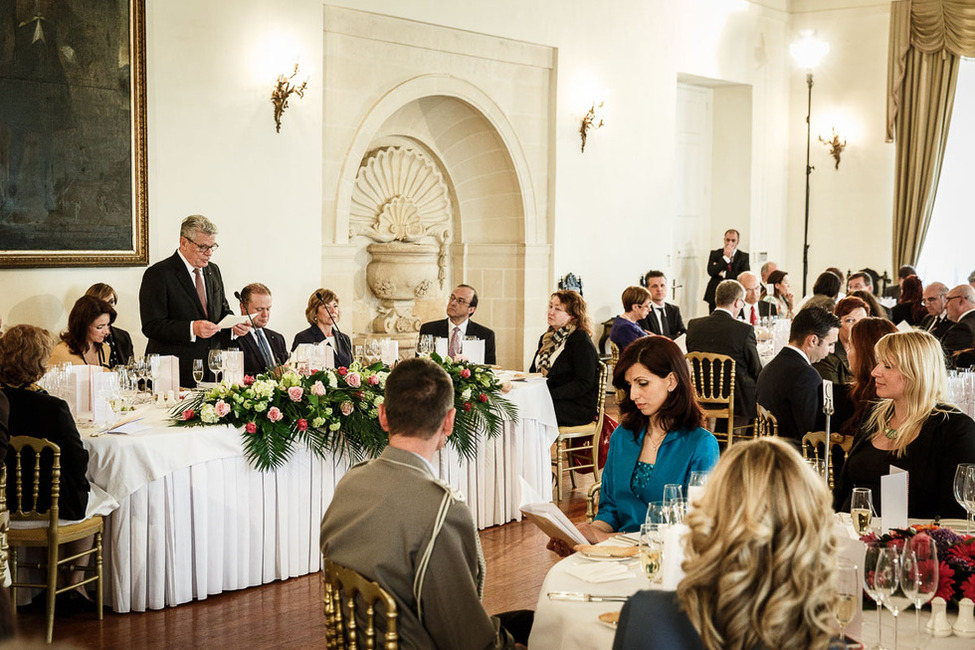I was already utterly thrilled by what I saw of Valletta’s magnificent architecture yesterday. And now today, visiting your office, I have the chance to see one of the city’s most beautiful façades and at the same time to thank you for your hospitality. I deeply appreciate your kindness and the warmth of the welcome I have received here in your country.
I am fascinated by this building, now your office, formerly an Auberge of the Order of St. John, not least because it was once the symbol of one of the eight Langues of the Order. The Auberge is thus a wonderful embodiment of the various cultural influences to which Malta has been exposed over the course of its history and which are so strikingly reflected in your language.
Malta has been greatly shaped by its location in the Mediterranean, between Europe and Africa. The Phoenician word for the Maltese archipelago, Malet
, is thought to have meant a place of refuge
. And that is precisely what Malta is again today – a place of refuge for many people fleeing across the Mediterranean to the Maltese islands to escape suffering and persecution. For this reason, migration and asylum policy issues are extremely important to Malta. We in Germany appreciate Malta’s engagement and achievements in taking in refugees. Rest assured that Germany is aware that in doing so Malta is facing huge challenges. That is why we need to discuss ways in which to distribute the burdens fairly. And yet, it is the responsibility of each and every individual and of every state to do what it can to ensure that we receive refugees in a humane manner.
For this goes to the very heart of our values. And we should not forget this: it is not long at all – think of 1945 – since Europe itself was a continent of the stranded and displaced. Today refugees are seeking safety in a Europe which has pledged to uphold human rights. Showing these people solidarity is a pan European responsibility. The aim of a truly European policy on refugees must be to protect not only Europe’s borders, but also human lives on those borders.
Of course, we Europeans can meet this aim only if we work together. There is – fortunately – an intense debate on this within the European Union, a debate to which Malta and Germany can make vital contributions.
One aspect of this debate is the need to look at the causes of the refugee flows as well. One of these is the arc of crisis from the Maghreb to the Middle East which is posing new challenges to our foreign policy.
In the discussion on the future of the European Neighbourhood Policy, Germany – not least by dint of its geographical location at the centre of Europe – has an important role to play as a link between the southern and eastern EU member states and their partners.
In this context, the Mediterranean Academy of Diplomatic Studies (MEDAC) of the University of Malta, which has been training Arab diplomats for many years, plays a key role as an instrument of active neighbourhood policy. In recognition of the special role played by MEDAC, the Federal Foreign Office finances a German Chair for Peace and Conflict Studies. This is a particularly good example of how Malta and Germany can cooperate for the benefit of the region.
I have already touched on Malta’s many different cultural influences and experiences. In this age of globalisation in particular, diversity is an advantage. Those who experience ethnic and cultural diversity in their own country will find it easier to interact and do business with people from far flung corners of the world. This is yet another reason why I am confident that Malta will derive tremendous opportunities from its location and traditions. And I very much hope that our countries will continue their close and trusting cooperation in the future.


